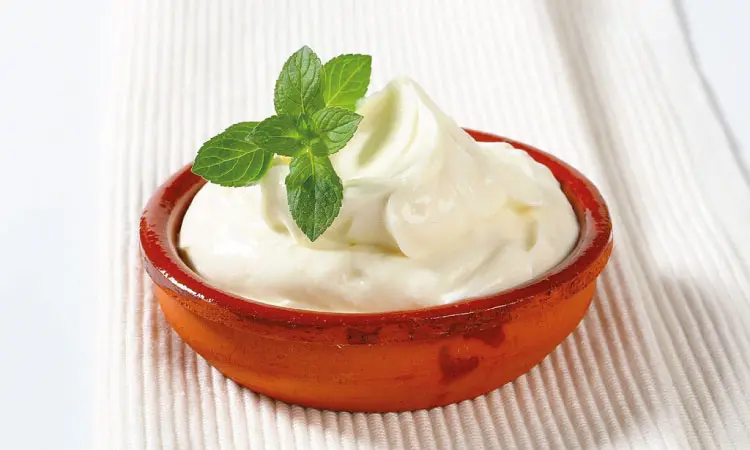It is quite an exciting time when your baby transits from breast milk to other food. On the other hand, it could also raise your many thoughts on what food to offer and what not to. Most parents wonder whether it is wise to give curd to babies, given the many benefits curd has to offer. If you are thinking about when to start curd for babies, the best time to offer this thick creamy food to your little one is right after they complete six months of breastfeeding. It is highly recommended to only feed breast milk to babies till 6 months of age.
Once you decide to feed your baby curd, other questions will arise such as whether giving sour curd for babies is fine and if we can offer curd to baby at night. Science has it that curd has abundant benefits. It contains a good amount of probiotics and is loaded with essential nutrients required for the body.
Curd is also one of the most loved food by many kids, read on to know about its benefits and much more.

When Can A Baby Start Having Curd
When to give babies dairy products can be confusing because few say milk other than breast milk, isn’t recommended before one year yet products like cheese, yogurt, and curd can be introduced. The best time to start introducing curd to a baby is after they complete six months.
You can start giving curd to babies with a tablespoon to see for any allergies or discomforts shown by the baby. It is also best to follow the three-day rule to see if the baby is accustomed to the new food. Make sure to start it in the daytime and not to give curd for the baby at night — on the first attempt.
Related Reading: Are Bananas, Milk Or Curd Given To Babies When They Have Cold?
Curd contains probiotics, which are beneficial bacteria (or the nutrients that promote the growth of the beneficial bacteria). The best curd to offer to your kid is homemade or the curd that is plain, unsweetened, pasteurized yogurt (regular or Greek) made from whole milk containing live cultures or probiotics.
Plus, curd does not need to be chewed and can be easily eaten by babies with no teeth.
Nutritional Value Of Curd
Curd is one of the natural foods with high probiotics that have been eaten for thousands of years and is frequently used as part of everyday meals in India. It contains beneficial bacteria that contain many health benefits beyond plain milk. Natural curd is thick and white and is the best way to get all the benefits of curd for babies.
Being rich in probiotics, a serving of curd is helpful to treat several ailments like diarrhea, lack of appetite, and many other stomach-related problems. It contains a good amount of protein which is necessary for the growth and development of the baby. Also, 80 percent of curd is water. Hence it will help to make your child feel hydrated.
Curd is also loaded with riboflavin, Vitamin A, Vitamin B6, Vitamin B12, and pantothenic acid. The nutritional value of curd is given below for your reference.
Nutrition Facts Serving Size: 1cup (113 grams) Amount Per Serving Calories from Fat 33 Calories 69 % Daily Value* Total Fat 3.7g 6% Saturated Fat 2.4g 12% Cholesterol 15mg 5% Sodium 52 mg 2% Potassium 176 mg 5% Total Carbohydrates 5.3g 2% Dietary Fiber 0g 0% Sugars 5.3g Protein 3.9g Vitamin A 2% Vitamin C 1% Calcium 14% Iron 0% * Percent Daily Values are based on a 2000 calorie diet.
Health Benefits Of Curd For Babies

Most of the kids love to eat curd which makes many mommies happy. Curd can also be a super wholesome food in place of milk. This means it can also be given to babies who are lactose intolerant. Giving curd to babies tops among the healthiest foods because of the significantly high amount of nutrients it contains, particularly protein and calcium. You can prepare it easily at home or it is always available in the markets too.
Related Reading: 10 Indian Baby First Foods 4-6 Months
Curd to babies can be given after they complete six months of breastfeeding. However, babies should not be given cow’s milk until closer to 12 months of age, because a baby’s digestive system may not well tolerate cow milk protein in large quantities.
The nutritional value of curd helps in the overall development and well-being of a baby. Besides the nutritional aspect, there are several benefits of feeding curd to babies, such as those listed below-
1. Giving curd to babies improves their digestive health
Culturing in milk takes place to prepare curd. This means the lactose content that is present in the milk is broken down. This makes it easy for the baby to digest curd. This is also one reason why many parents also prefer to offer dairy products such as cheese, paneer to their kids. Also, it is good for the baby’s gut.
2. Lactose intolerant babies can also be fed curd
Children who are lactose intolerant may not receive the natural form of protein and calcium as others get in milk. For such kids, curd comes as a savior as the lactose content is broken down which makes it easy for them to consume. Children who are allergic to whey or other milk products can digest curd easily2.
3. Curd is rich in probiotics
Giving curd to babies is beneficial as it is a rich source of probiotics. It contains a species of bacteria called lactobacillus1. This bacteria is found in the intestines and the urinary tract of humans naturally. This bacteria helps in protecting the body from diseases. Kids are usually prone to frequent illness and upset tummies due to their junk intake. A few spoonfuls of curd every day will help your child fight stomach-related issues.
4. Helps to sleep better
Due to its soothing nature, kids sleep better when the curd is included as a part of their meals3. Dairy products like curd contain an amino acid called tryptophan, which helps the child feel drowsier before heading to bed and convert to melatonin, improving sleep efficiency and reducing the number of awakenings.
5. Giving curd to babies helps to strengthen their bones and teeth
Curd is rich in magnesium, potassium, sodium, zinc, phosphorus, and vitamins, which helps your little ones stay strong and healthy. Also, curd has high calcium and calcium keeps your bones and teeth strong. This is why it is necessary for growing children.
Related Reading: 12 Best Foods For Baby Brain Development
When Not To Give Curd To Babies
It is good to give curd to your kids as a morning snack or during lunch in case it is the first time you are offering curd to your child. There is no restriction on offering curd to babies. Curd is a good food choice for babies, as long as you go with a full-fat, unsweetened variety. To get the maximum benefits out of curd choose a curd that contains live cultures or probiotics.
Look out for signs of allergic reaction when you introduce curd to babies, especially if you have not given your baby formula or any other forms of dairy previously. Offer curd to babies when your baby has already tried a few foods that do not commonly cause allergies. Make sure you follow the three-day rule to ensure the baby is doing fine with the food.
Tips To Note When Giving Curd To Babies

Following are a few tips that might be useful for you while giving curd to babies
- Introduce curd to babies when your baby has already started solids
- Choose a full-fat variety with no added sugar in case you opt for a store-bought one
- Store curd in a clean container at room temperature. Do not give chilled or refrigerated curd to kids which could cause colds
- Avoid giving curd to the child when they have a cough and cold. Wait for a few days for the infection to subside and then resume again
- Always opt for homemade curd for your little one
- You can make varieties by adding curd with mashed bananas, stewed apples, boiled and mashed carrots, potatoes, rice
- Give full-fat milk curd to your baby until advised against it by your doctor.
- Yoghurt may turn sour soon. Hence store it in a cool place or under refrigeration. However, remove it from the fridge at least an hour before offering it to the child
FAQs
The intake of curd by babies depends upon their age. Though curd can be offered to the child upon completion of their sixth month, for a child aged eight to 12 months it is better to offer 1/4 to 1/2 cup of curd. Toddlers (ages 12-24 months) can have two or three servings of dairy a day, which is like 1/2 cup of milk, 1/2 oz cheese, and 1/3 cup of curd.
If your child is on milk rather than formula or breast milk (after age one), you may offer around 1/2 cup curd. You can also contact the child’s pediatrician to know if you can offer more or less than the mentioned quantity.
The best time to offer curd is for babies is when the baby is ready for solids. Babies generally show interest in solids by 6-8 months. Full-fat (or whole milk) plain curd that has been pasteurized is best for babies. Curd comes with all-important calcium for bone development, some vitamin A for eye, skin, and immune health, all B-vitamins for energy, zinc for immune health, and potassium. Hence make it a part of your baby’s everyday meal to get its maximum benefits.
It is safe to consume curd in all seasons. The immune-boosting properties of curd make it a recommended choice to be consumed during winter to keep common winter illnesses at bay. Cold and flu are not caused by cold weather or cold food rather are caused by viral infections.
